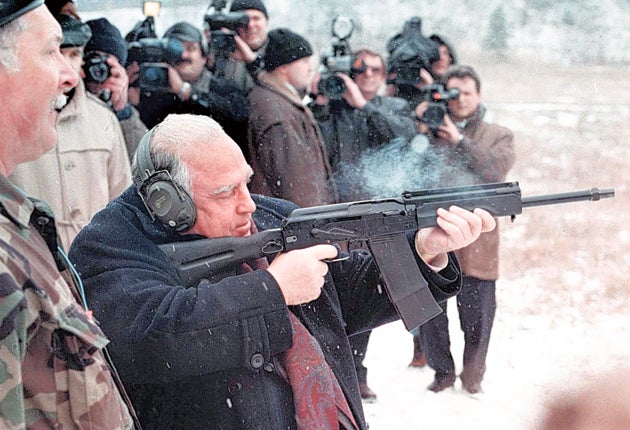Viktor Chernomyrdin: Politician who served as a buffer between the Soviet old guard and Russia's new reformers

Your support helps us to tell the story
From reproductive rights to climate change to Big Tech, The Independent is on the ground when the story is developing. Whether it's investigating the financials of Elon Musk's pro-Trump PAC or producing our latest documentary, 'The A Word', which shines a light on the American women fighting for reproductive rights, we know how important it is to parse out the facts from the messaging.
At such a critical moment in US history, we need reporters on the ground. Your donation allows us to keep sending journalists to speak to both sides of the story.
The Independent is trusted by Americans across the entire political spectrum. And unlike many other quality news outlets, we choose not to lock Americans out of our reporting and analysis with paywalls. We believe quality journalism should be available to everyone, paid for by those who can afford it.
Your support makes all the difference.Viktor Chernomyrdin played a vital role in Russia's first tumultuous post-Soviet decade, as a solid and pragmatic counterpart to the erratic President Boris Yeltsin and as a bridge between the Communist old guard and the inexperienced young reformers who were shaping the country's future.
Chernomyrdin was chairman of the giant energy combine Gazprom when Yeltsin appointed him in 1992 as prime minister to replace Yegor Gaidar, whose "shock therapy" market reforms had made him hugely unpopular, both among ordinary Russians and the old ruling elite.
Chernomyrdin held the job through six years of turmoil. He was dubious about many of the changes – hisjudgement years later was that on balance Western economic ideas "had done more harm than good" for Russia. But he did not overturn the reforms either, realising that for better or worse there was no going back to the old Soviet Union.
In some respects, Chermomyrdin and Yeltsin were similar. Both were from the industrial Urals, down-to-earth and of modest background, and both rose through the ranks of the party and state-run industry; Yeltsin as a construction manager, Chernomyrdin in the oil and gas sector. But whereas the future president thrived on crisis, drama and the limelight, his prime minister was a calming influence, a highly effective negotiator and fixer behind the scenes, whose burly presence alone was somehow reassuring – just as was the mangled way with words for which he would quickly become famous.
He was also unswervingly loyal to his boss, never more so than in the 1993 showdown between Yeltsin and the Russian parliament that brought the country to the brink of civil war. At one point, Chernomyrdin called a speakerphone conference of regional governors, telling them of their duty to support the popularly elected president. The conference was never made public, but was, according to Vladimir Ryzkhov, a member of the Duma, "the decisive moment" in the crisis.
In 1995, with Yeltsin away on a trip to Canada, he handled the negotiations with Shamil Basayev, the Chechen rebel leader who had seized over 1,000 hostages in the southern Russian city of Budyonnovsk. Chernomyrdin was later criticised for the deal he struck, but at the time it undoubtedly prevented a bloodbath. Four years later, as Yeltsin's personal envoy to Yugoslavia, he convinced President Slobodan Milosevic to pull Serbian forces out of Kosovo, and is said to have persuaded the Clinton administration to halt the Nato bombing campaign against Serbia.
In March 1998, Chernomyrdin was dismissed as Prime Minister. A few months later, as financial crisis engulfed Russia, Yeltsin tried to bring him back, but the move was blocked by Parliament and the president was forced to appoint the more popular Yevgeny Primakov instead.
But Chernomyrdin's career inpublic life was not over. In 2001 Vladimir Putin, Yeltsin's successor, chose him as Russia's ambassadorto Ukraine. The appointment was widely seen as a device to remove a potential rival from the centre of power in Moscow. In fact his vast experience in the energy industry meantthat Chernomyrdin played a crucial role in the repeated rows with Kiev over natural gas delivery contracts and payments.
He made few friends among Ukraine's pro-western reformers, once suggesting that the then President Viktor Yushchenko was acting on the orders of the US government, and declaring that "American ears are sticking out everywhere." But he stayed in the post until his retirement in 2009.
Ultimately perhaps, Chernomyrdin left two enduring legacies to his country – and neither centred primarily on his prime ministership or his diplomatic service. The first was Gazprom, which he converted from ministry into state corporation, and thanks to which he became a very rich man. One of the world's largest energy companies, Gazprom is a pillar of post-Soviet Russia, a powerful and controversial power-base in its own right.
The second legacy is Chernomyrdin's folksy turn of phrase and his penchant for utterances such as "we will live so well our children and grandchildren will envy us." Most celebrated of all was his comment after a botched currency reform in 1993, that reflects a weary Russian truth. "We wanted to do it better," he said, "but it turned out as usual."
Rupert Cornwell
Viktor Stepanovich Chernomyrdin, politician: born Cherny Ostrog, Russia 9 April 1938; chairman, Gazprom 1989-1992; Prime Minister of Russia 1992-1998; Russian Ambassador to Ukraine 2001-2009; married (two sons); died 3 November 2010.
Join our commenting forum
Join thought-provoking conversations, follow other Independent readers and see their replies
Comments